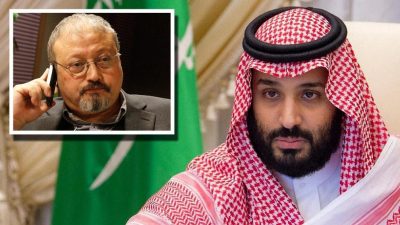Saudi Crown Prince MBS’ Asia Tour Is Much More than a Post-Khashoggi Photo-Op

Many have dismissed Saudi Crown Prince Mohammed Bin Salman’s Asia tour to Pakistan, India, and China as nothing more than a post-Khashoggi photo-op to shore up international support, but it’s actually about much more than that because of its religious, economic, and geopolitical dimensions.
There’s little doubt that Saudi Crown Prince Mohammed Bin Salman’s (MBS) international reputation will receive a much-needed boost as a result of his Asia tour to Pakistan, India, and China in the aftermath of Khashoggi’s killing, but unlike what many are saying about this trip, it’s about much more than a “politically convenient” photo-op. Those who dislike MBS, especially within the Western Establishment, will continue to do so regardless of how enthusiastic Asian audiences are in receiving him, so it’s irrelevant to make the dismissive remark that he only embarked on his journey to make himself look better in their eyes. Actually, while his profile will probably rise in each of the three countries that he travelled to, he chose them in order to accomplish very real religious, economic, and geopolitical objectives that will be concisely summarized below in easy-to-read bullet point form:
Religious
Pakistan
The visit of the next Custodian of the Two Holy Mosques to the Islamic Republic of Pakistan is intended to strengthen intra-Ummah relations.
India
Similarly, the optics of his trip to India – in spite of the ruling BJP-led government’s anti-Muslim stance – carry with them the hint of inter-civilizational cooperation between a Muslim and Hindu government.
China
Likewise, MBS’ trip to China shows that he has no problem cooperating with a formally atheist state and doesn’t buy into the Mainstream Media’s fake news about its alleged treatment of the Muslim Uighur.
Economic
Pakistan
The $20 billion of investments that MBS committed to Pakistan proves that Saudi Arabia has a serious stake in the success of the China-Pakistan Economic Corridor (CPEC).
India
Saudi Arabia sees India as an exciting new partner with enormous potential that his Kingdom can tap into to establish itself as a key player in its long-term rise as an envisaged hemispheric Great Power.
China
The People’s Republic is predicted to play an outsized role in MBS’ ambitious Vision 2030 socio-economic reform agenda, especially when it comes to possibly financing the NEOM future city.
Geopolitical
Pakistan
Given that Pakistan is the global pivot state, Saudi Arabia clearly wants to play a role in the cutting-edge Eurasian integration processes that Islamabad is expected to lead through its CPEC+ corridors.
India
MBS is mostly interested at this stage in “poaching” India away from Iran by actually turning it into the “client state” that the Mainstream Media falsely fearmongered he intended to do to Pakistan.
China
The success of Vision 2030 and Saudi Arabia’s ultimate transition to a post-oil economy is largely dependent on Chinese support, which will make or break the Kingdom’s future Great Power plans.
*
Note to readers: please click the share buttons below. Forward this article to your email lists. Crosspost on your blog site, internet forums. etc.
This article was originally published on Eurasia Future.
Andrew Korybko is an American Moscow-based political analyst specializing in the relationship between the US strategy in Afro-Eurasia, China’s One Belt One Road global vision of New Silk Road connectivity, and Hybrid Warfare. He is a frequent contributor to Global Research.

